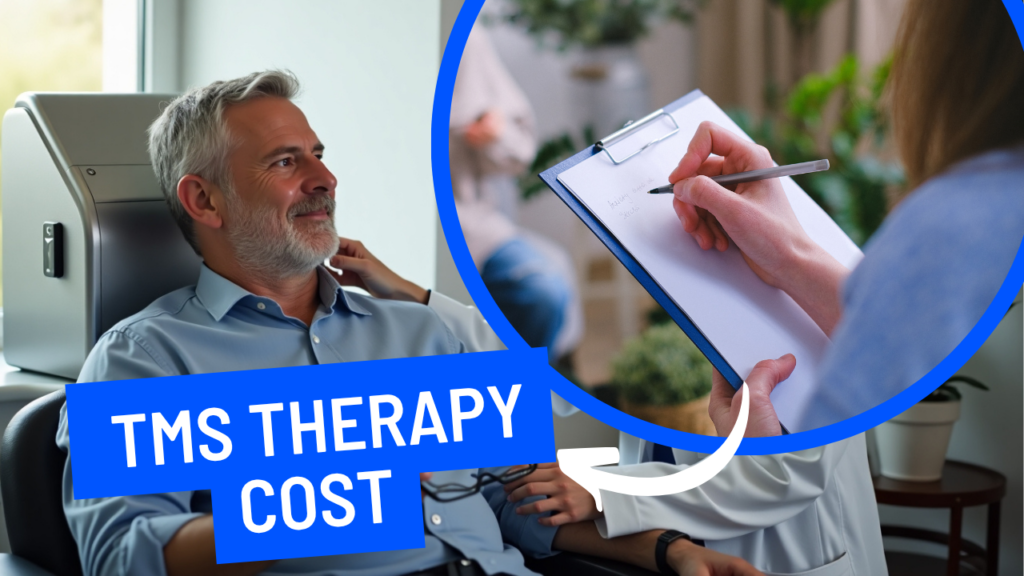Table of Contents
ToggleIntroduction
If you or a loved one is considering Transcranial Magnetic Stimulation (TMS) for depression, one of the first questions you likely have is: “How much does TMS therapy cost?”
TMS therapy is a FDA-approved, non-invasive treatment for major depressive disorder (MDD) and other mental health conditions. Unlike antidepressants, it uses magnetic pulses to stimulate nerve cells in the brain, offering hope for those who haven’t responded to traditional treatments. While TMS therapy offers promising results, many patients face significant financial considerations – a complete treatment regimen typically falls between $6,000 and $12,000, creating an important factor to weigh when exploring treatment options.
In this guide, we’ll break down:
✅ Average TMS therapy costs (per session and full treatment)
✅ Does insurance cover TMS? (Medicare, Medicaid, and private insurers)
✅ Ways to reduce out-of-pocket expenses (payment plans, clinical trials)
✅ Is TMS worth the cost? (Success rates vs. alternatives)
Let’s dive in.
How Much Does TMS Therapy Cost in 2025?
1. Average Cost of TMS Therapy
Per session: $300 – $500
Full treatment (30-36 sessions): $6,000 – $12,000
Maintenance sessions (if needed): $100 – $300 per session
Why such a high price?
Specialized equipment (TMS machines cost clinics $50,000+)
Trained professionals required (psychiatrists or neurologists)
FDA-approved treatment (regulated and clinically proven)
Cost Comparison:
| Treatment | Average Cost | Duration |
|---|---|---|
| TMS Therapy | $6,000–$12,000 | 6–8 weeks |
| Antidepressants (Yearly) | $300–$1,200 | Ongoing |
| ECT (Electroconvulsive Therapy) | $1,000–$2,500 per session | Multiple sessions needed |
2. Does Insurance Cover TMS Therapy?

Private Insurance (Blue Cross, Aetna, Cigna, etc.)


Failed 2+ antidepressants
Diagnosis of major depressive disorder (MDD)
Prescribed by a psychiatrist

Off-label uses (anxiety, OCD, PTSD)
Maintenance sessions
Medicare & Medicaid Coverage


How to Verify Your Insurance:
Call your insurer and ask:
“Is TMS therapy covered for depression?”
“What are the pre-authorization requirements?”
Ask your TMS clinic for insurance verification assistance.
3. How to Reduce TMS Therapy Costs
1. Insurance Appeals
If coverage is initially refused, work with your mental health provider to prepare a comprehensive appeal demonstrating the clinical justification for TMS in your case.
2. Payment Plans & Financing
Many clinics offer interest-free payment plans (e.g., $200/month).
CareCredit (medical financing) can help spread out costs.
3. Clinical Trials
Some research studies offer free or discounted TMS (check ClinicalTrials.gov).
4. Sliding Scale Clinics
Non-profit hospitals may offer income-based discounts.
4. Is TMS Worth the Cost? Success Rates & Alternatives
TMS Success Rates
50–60% of patients see significant improvement.
30% experience full remission from depression.
Cheaper Alternatives
| Treatment | Pros | Cons |
|---|---|---|
| Antidepressants | Low cost | Side effects, may stop working |
| Talk Therapy | No side effects | Slow results, not always covered |
| ECT | Fast-acting | Memory loss, requires anesthesia |
Verdict: If antidepressants haven’t worked, TMS is often worth the investment—especially with insurance coverage.
Final Thoughts: Is TMS Therapy Affordable for You?

The cost of TMS therapy can be steep, but insurance coverage and financing options make it accessible for many. If you’ve struggled with treatment-resistant depression, TMS could be a life-changing investment in your mental health.
Next Steps:
Check your insurance coverage (call your provider).
Contact a TMS specialist clinic to discuss your eligibility – most provide free preliminary consultations to evaluate your candidacy.
Explore payment plans if paying out-of-pocket.
Have questions? Drop them below—we’re here to help!
(Disclaimer: This article is for informational purposes only. Always consult a healthcare provider before starting any treatment.)

